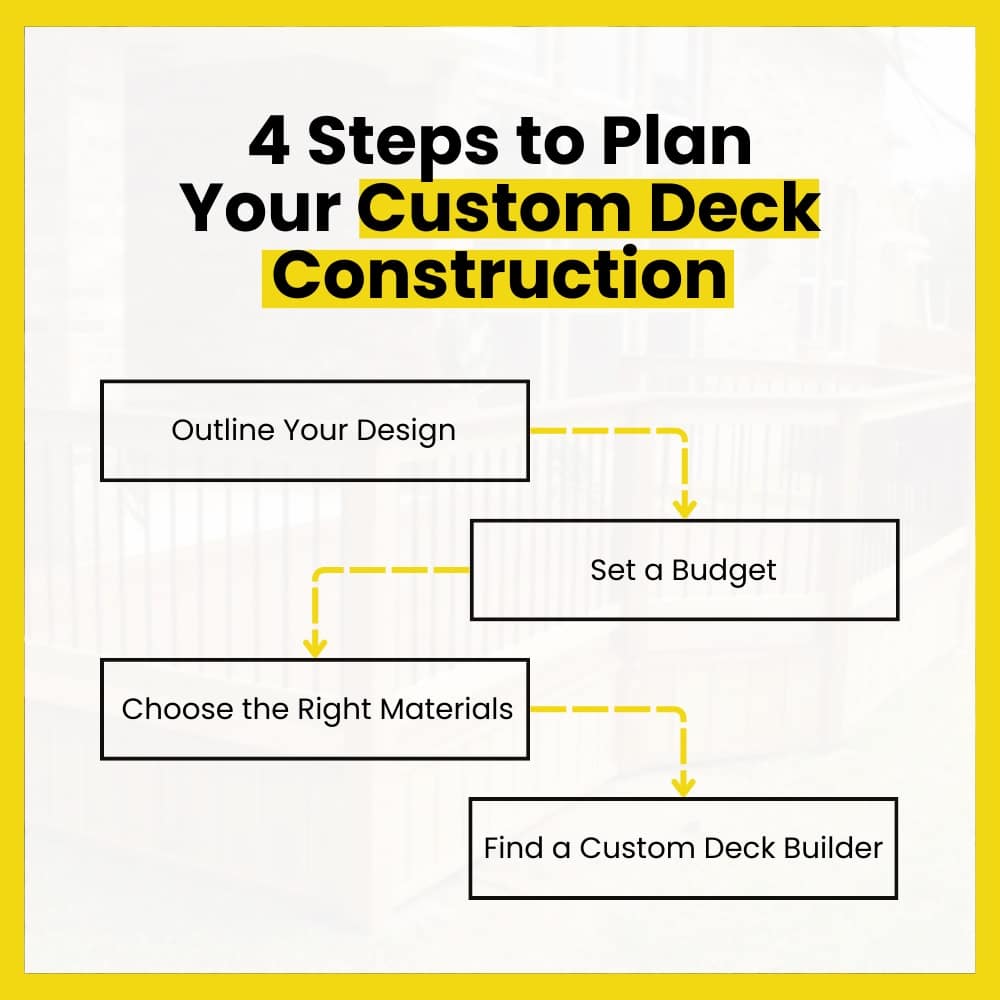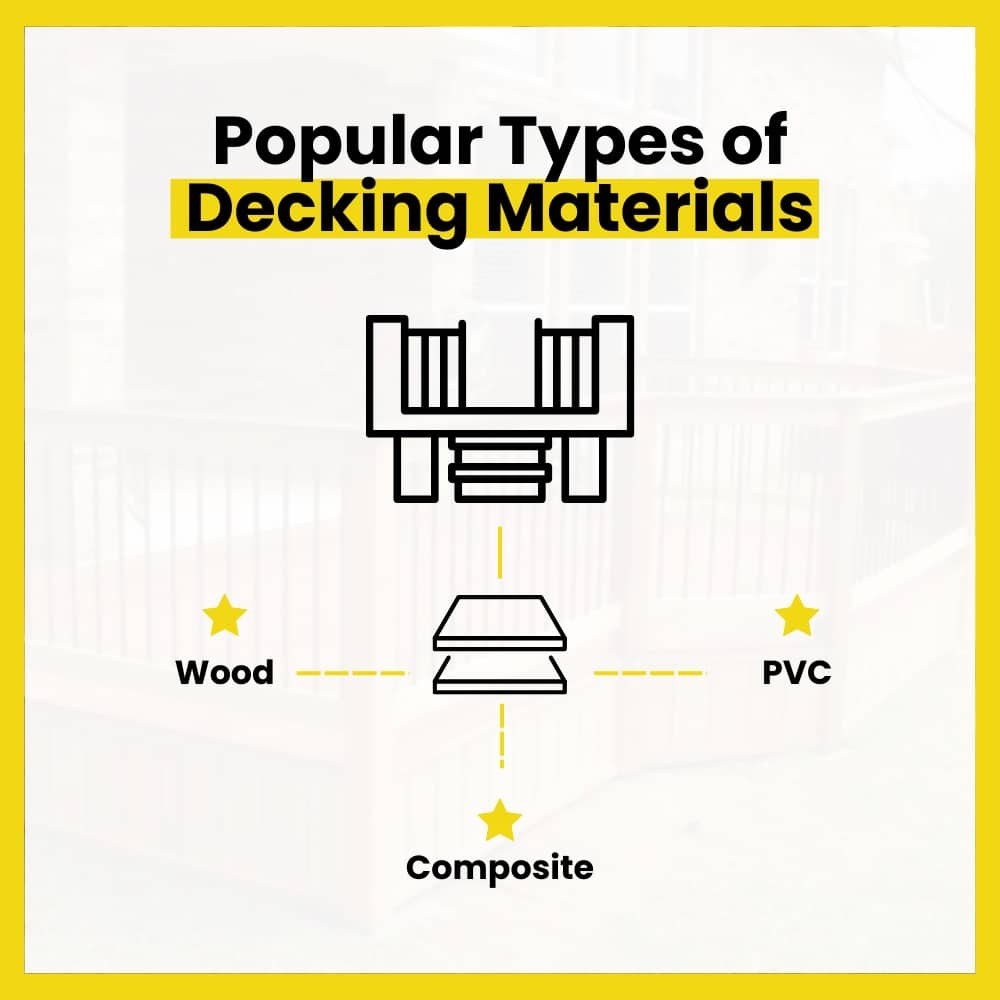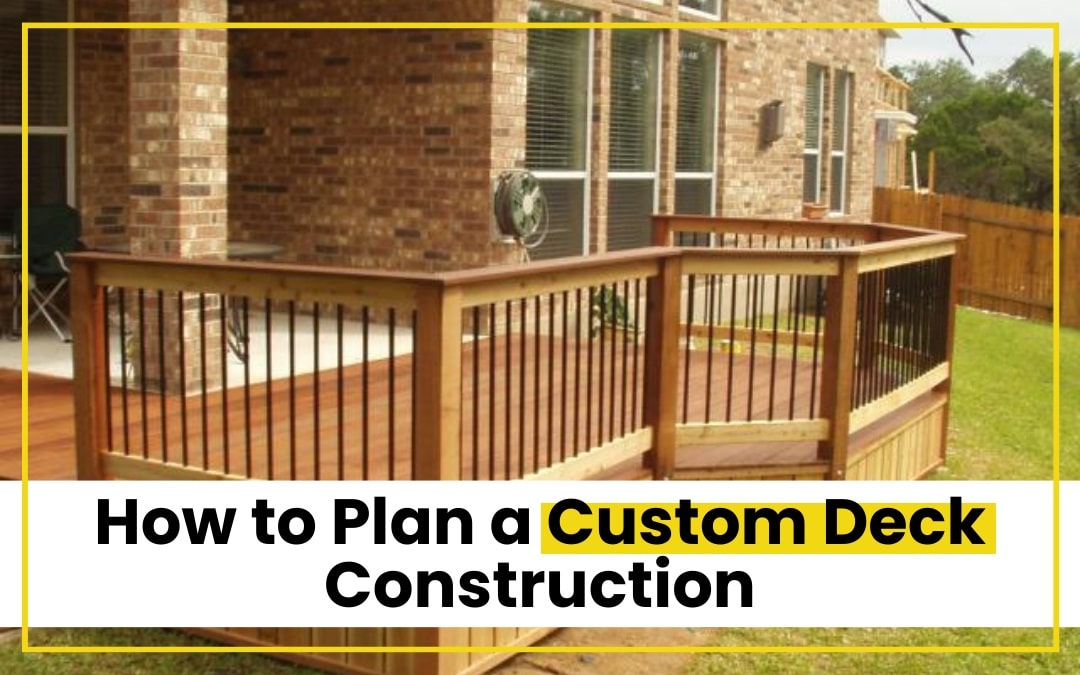Planning a custom deck construction can significantly enhance your outdoor living space.
Whether you’re looking to build a cozy spot for your morning coffee or a spacious area to host your next barbecue, a well-constructed deck can add function and value to your home.
This guide will walk you through the critical steps of designing and building a custom deck – from setting a realistic budget to choosing durable materials and finding the right builder.
With clear, actionable advice, we’ll help you navigate the deck construction process. so you make informed decisions for your project.
City vs Suburb: How Location Affects the Deck Construction Process
When you’re planning a custom deck, your location plays a crucial role.
In the city, limited space means you have to get creative with your deck design to maximize every square inch.
You’ll also have to deal with stricter building codes that can limit what you can do.
For example:
If you live in the Metro Atlanta area, pouring concrete isn’t feasible on large buildings. Instead, you’ll need to use steel substructures in place of the usual wood or metal frames.
This prevents issues like rot, so it’s easier to maintain your deck.
In the suburbs, you usually have more room to build and can be more flexible with your design.
The usual deck construction process is followed by digging holes for foundation posts and attaching a ledger board as an extension.
Regardless of where you build, you need to make sure you have the right permits and follow the local building codes.
Getting a professional custom deck builder can help you navigate these requirements and make sure your deck is built right.
How to Start Planning Your Custom Deck Construction
A custom deck construction starts with a solid plan.
This initial phase is where you lay the groundwork for your dream outdoor space.
It’s also where you plot your design, budget, and material choices.
It’s crucial to approach this step methodically to ensure your deck not only meets your vision but also adheres to quality standards.

Outline Your Design
When designing your custom deck, function is a priority. Think about what kinds of activities you’ll host on your deck.
If you’re keen on alfresco dining, consider the proximity to your kitchen for easier food prep and cleanup.
For those who relish relaxation, consider the sun’s path throughout the day. This helps determine the ideal placement for lounging areas.
You can even add an awning or pergola for shade.
Privacy is another key consideration, especially in densely populated areas.
Privacy screens or tall plants can provide seclusion without compromising the aesthetic.
It’s also vital that your deck’s design is cohesive with the architectural style of your home. It should complement and not clash with your living space.
Set a Budget
Approaching your deck project with a well-defined budget is vital for a smooth construction experience.
Start by figuring out your total available funds for the project, then break down the budget into detailed categories.
Allocate a portion for materials. Some options like composite or PVC decking may be pricier but they offer long-term savings due to lower maintenance.
Labor costs can vary widely, so get quotes from different custom deck contractors in your area.
Don’t forget to account for the often-overlooked expenses, such as building permits and local council fees.
If you’re planning for additional elements like built-in lighting, benches, or a pergola, itemize these separately since they can affect the overall cost.
It’s also a wise strategy to reserve a contingency fund equal to around 10-15% of the total budget.
This is to cover any unforeseen expenses like price fluctuations in materials, changes to the project scope, or additional labor.

Choose the Right Materials
The material you choose for your deck determines its look, durability, and maintenance needs.
- Wood: Offers a classic aesthetic but requires regular upkeep, including staining and sealing to prevent wear from the elements.
- Composite: A mix of wood fibers and plastic, it’s durable, low-maintenance, and comes in various colors; plus, it doesn’t splinter, making it safer for bare feet.
- PVC: This plastic material is highly resistant to elements, low in maintenance, and mimics wood’s appearance. It’s also lightweight, which may reduce the structural demands on your property.
When selecting, consider your local climate and the deck’s intended use. Discuss with your builder for the best material that balances cost, longevity, and upkeep.
Find a Custom Deck Builder
Start by checking online reviews of deck builders in your area. You can also ask for recommendations from friends or family.
It’s important to assess the builder’s previous work for quality and style compatibility.
A good deck builder should also be familiar with local building codes and permit requirements, which can save you from costly mistakes or delays.
They should provide a detailed contract and a clear communication channel throughout the project.
An experienced builder will guide you through the design process and offer practical solutions so you get the best value for your money.

Can a Custom Deck Improve Your Lifestyle?
A custom deck can definitely improve your lifestyle.
Even if they’re minor changes, a space that connects you with the outdoors can make a big impact.
Increased Living Space
A well-designed deck effectively adds another room to your home, but with the unique advantage of being outdoors.
This space can serve multiple functions—from a peaceful retreat for morning yoga to an extended play area for the kids.
The added square footage is not just for leisure.
It can also serve practical purposes like an open-air dining area or a flexible spot for home projects.
Connection to Nature
Decks create a seamless transition between the indoors and the outdoors.
This lets you to enjoy the beauty of your surroundings more easily.
Spending time in nature, even just in your backyard, has been linked to reduced stress levels, improved mood, and increased mental clarity.
Whether it’s for growing a small herb garden or simply getting more fresh air, a deck puts you closer to the calming effects of nature.
Higher Property Value
Investing in a custom deck can pay off if you decide to sell your home.
Prospective buyers often view a deck as a desirable feature, which can make your property stand out in the market.
Not only can it increase the visual appeal of your home, but it can also lead to a higher resale value if you decide to sell your home.
A well-constructed deck expands the usable living space which is a tangible benefit buyers may pay extra for.
And because outdoor living spaces are in high demand, a deck can significantly shorten the time your home is on the market.
It also helps to know that the return on investment for deck additions has consistently ranked well compared to other home improvement projects.
Start Your Custom Deck Construction Project with Perimeter Remodeling
Custom deck construction is an investment in both your home’s value and your lifestyle.
The process requires thoughtful planning, a sensible budget, the right materials, and a trusted builder.
But the payoff is more than worth it.
A well-crafted deck is more than an addition. It’s a gateway to a more enjoyable home life.
So as you take on this project, focus on the long-term benefits.
Ready to get started on building your own custom deck? Contact Perimeter Remodeling today to get your free quote!



Recent Comments